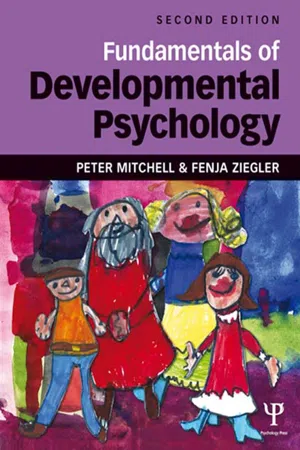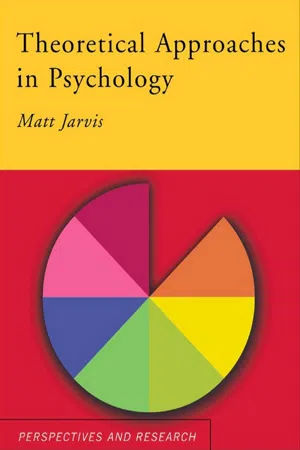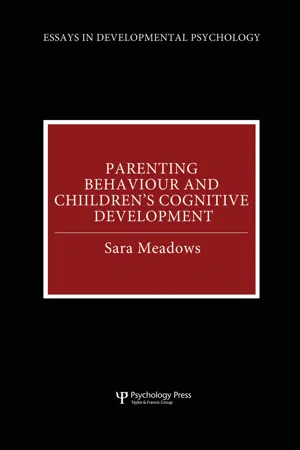Psychology
Cognitive Development in Childhood
Cognitive development in childhood refers to the growth and maturation of a child's mental processes, including perception, memory, problem-solving, and language acquisition. This development is influenced by both biological and environmental factors, and it occurs in distinct stages, as proposed by theorists like Jean Piaget. Understanding cognitive development in childhood is crucial for educators, parents, and psychologists in supporting children's learning and overall well-being.
Written by Perlego with AI-assistance
7 Key excerpts on "Cognitive Development in Childhood"
Learn about this page
Index pages curate the most relevant extracts from our library of academic textbooks. They’ve been created using an in-house natural language model (NLM), each adding context and meaning to key research topics.
- eBook - ePub
Introducing Piaget
A guide for practitioners and students in early years education
- Ann Marie Halpenny, Jan Pettersen(Authors)
- 2013(Publication Date)
- Routledge(Publisher)
Chapter 2The landscape of Cognitive Development in ChildhoodIntroduction
Cognitive development refers to the changes and growth in thinking processes such as memory, problem solving and reasoning. This chapter aims to provide a simple overview of the domain of Cognitive Development in Childhood. While exploring this aspect of development, we will also try to draw in some of the implications of cognitive development for other aspects of development such as social and emotional knowledge. Links between play and cognitive development are also considered. We will conclude this chapter with some reflections on Piaget's stage theory of cognitive development, the implications of this stage theory for early childhood education and, finally, draw together information on some of the key theorists who were working in the field of cognitive development both at the time of Piaget and since then.Defining cognitive development
Cognitive development refers to knowing, understanding, mental representation, thinking and remembering and how these processes change and develop as children grow through infancy and early childhood. As Schaffer expresses it:Included here are processes such as perception, remembering, classifying, understanding, reasoning, thinking, problem-solving, conceptualising, classifying and planning — in short, all those expressions of human intelligence that we use to adapt and make sense of the world.(2006, p. 96)Meaning making
One of the greatest challenges in early childhood is making meaning of all the novel experiences that arise on a daily basis. Smidt (2011) draws attention to the many ways in which children work hard to make sense of the world, in particular with regard to learning to interpret the signs and symbols in their environment. Vygotsky and Bruner highlighted the central role that language plays in this process of making sense or making meaning of our experiences. - eBook - ePub
Developmental and Educational Psychology for Teachers
An applied approach
- Dennis McInerney, David Putwain(Authors)
- 2016(Publication Date)
- Routledge(Publisher)
5 Cognition and cognitive development: infancy to late childhoodIntroductionIn the last two chapters we have considered the physical growth of children from early childhood through to early adulthood. We noted that cranial growth during the early childhood years is very significant and by the age of five years has achieved 75% of its adult size. The development of the brain is directly related to the development of motor coordination and a number of other developmental trajectories. Accompanying this cranial growth is also the development of cognition. Cognitive development is the development over time of the ability to think and reason and to understand the world in which we live. A knowledge of cognitive development is essential for teachers and educators. Does a child think in the same way as an adult? How does a child process information? When can we expect a child to perform particular mental processes? What is intelligence? What is creativity? Can we measure these? What influences cognitive development? These, and many other questions, are of central importance to educators.What is cognition? Broadly, cognition refers to the intellectual activity of an individual, i.e. the mental processes; involving all aspects of thought and perception. As with the development of the physical structures of the body, the major cognitive processes that are inherent in being human, mature in an orderly way in children provided the environment contains the normal experiences of childhood such as social interaction, environmental stimulation, and good diet. In other words, a child in any normal environment will develop a full range of cognitive capacities. However, limited environments (that is those restricting the experiences a child has access to, such as poorly run institutional homes, severely abusing and neglectful homes, or severe malnourishment) may impede normal cognitive development. - eBook - ePub
- Peter Mitchell, Fenja Ziegler(Authors)
- 2013(Publication Date)
- Psychology Press(Publisher)
3 DOI: 10.4324/9780203736357-3Contents
Introduction Stages of cognitive development Piaget’s explanation of cognitive development Traditional learning theory as a contrasting explanation of development A supplement to Piaget’s theory: Self-centered adolescents SummaryThe development of thinking 3
Chapter Aims- To introduce Piaget’s theory of cognitive development. To detail Piaget’s stages.
- To detail the evidence that lends support to Piaget’s stage theory.
- To present the mechanism that Piaget posited as responsible for cognitive development.
Introduction
The discipline concerned with studying the development of thinking is cognitive developmental psychology. The word “cognitive” refers to knowledge, but not necessarily according to the common meaning of the word. When people talk about knowledge, they usually mean the kind of information useful for answering questions in games such as The Weakest Link or Who Wants to be a Millionaire, or in order to do college exams. In contrast, cognitive developmentalists think of knowledge as referring to understanding about things.You might have noticed a child aged around 5 years speaking on the telephone about things only he can see: He seems to overlook the fact that the person he is speaking to is in a completely different location and cannot see the same things. Perhaps this is a sign that the young child is incapable of putting himself in someone else’s shoes. In the broadest sense, it is tempting to suppose that the child does not understand that other people can have different perspectives. Cognitive developmentalists look at particular difficulties children have, such as poor communication ability, and then draw general conclusions about their underdeveloped knowledge of the world. An exciting aspect of cognitive developmental psychology concerns the things children say and do in various situations, and then speculating about the meaning of these in terms of what the child does or does not know about the world. - eBook - ePub
Child and Adolescent Psychology for Social Work and Allied Professions
Applied Perspectives
- Gabriela Misca, Peter Unwin(Authors)
- 2018(Publication Date)
- Bloomsbury Academic(Publisher)
Cognitive development refers to the changes in how humans think and learn through their development from infancy to adulthood. It is important to clarify that the difference in cognitive development between infants and children and adults is not only quantitative – in the sense that children know less – but also qualitative as there are significant differences in how children think about and understand their experiences. Various theories and research have put forward ideas of how our cognitive abilities develop over the lifespan, particularly from infancy/childhood through to adulthood, where the most important leaps occur in cognitive development. In this section we will focus on two influential perspectives: Piaget’s (1964) theory of cognitive development and Vygotsky’s (1978) socio-cultural theory, highlighting their strengths, limitations and applications in contributing to our understanding of cognitive development.Piaget’s stage theory of cognitive developmentOne of the most popular and influential theories of cognitive development is that of the Swiss scientist, Jean Piaget. Piaget’s theories have been popular since the beginning of the twentieth century and became particularly popular in the 1960s as an alternative to the theories around behaviourism which were predominant at the time. Unlike behaviourism, which viewed development as a process provided by the environment and events experienced by the child, Piaget proposed that children make active sense of their experiences and construct their own knowledge – hence his theory being also referred to as constructivism.According to the theory of constructionism, children make active sense of their world and experiences and construct their own knowledge, doing so through various processes based on the concept of schema. Schema is a unit of knowledge that is used to understand a situation. Piaget proposes that we are born with a set of schemas, such as reflexes. When a new experience fits into an existing schema this is simply incorporated through a process of assimilation. For example, one of the innate reflexes is sucking and the newborn will apply this schema to any new object that s/he comes in contact with. However, when a new experience does not make sense and cannot be assimilated through existing schemas, this creates confusion, a state of disequilibrium. In order to achieve a state of equilibrium or adaptation to the environment, the infants and children must thus adopt a new approach through the process of accommodation. For example, when children name all animals ‘cats’ they assimilate, but when corrected and learn that some animals are named ‘dogs’, they accommodate their schemas to the new type of stimulus. Assimilation and accommodation work in tandem to support children’s organization of their knowledge into increasingly complex structures. - Bruce B. Frey(Author)
- 2018(Publication Date)
- SAGE Publications, Inc(Publisher)
Meagan M. Patterson Meagan M. Patterson Patterson, Meagan M.Cognitive Development, Theory of Cognitive development, theory of306 311Cognitive Development, Theory of
The theory of cognitive development developed by Swiss psychologist Jean Piaget (1896–1980) is one of the most influential theories in the fields of educational and developmental psychology. Piaget described his theoretical orientation as one of “genetic epistemology” focused on the emergence, growth, and evolution of knowledge. Piaget’s theory of cognitive development is premised on the notion that thinking and learning are adaptive; our cognitions allow us to adapt to and function effectively within our environments.Starting from this fundamental premise, Piaget explored the ways in which scientific thinking and reasoning develop, and how our interactions with the physical and social world shape our thinking. Piaget, along with other early psychologists such as William James and B. F. Skinner, contributed to the evolution of psychology as an empirical, rather than a purely theoretical, science. This entry discusses the development of Piaget’s theory of cognitive development, its major constructs, the stages of cognitive development, and how the theory has been evaluated, applied in education, and built on by other researchers.Piaget’s theory is a general theory, based on the premise that disparate aspects of cognition develop together, undergoing similar changes. In his research, Piaget explored many aspects of children’s thinking, including beliefs about the physical, biological, and social worlds. Piaget argued that cognitive development consists of a set of discrete stages and that thinking in different stages is qualitatively different. Piaget viewed cognitive development as driven by four critical factors: maturation, the physical environment, social interaction, and equilibration.Piaget argued that children learn and understand through action. For young children, this action is generally physical (e.g., grasping and manipulating objects), whereas for older children, the action may be physical or mental (performing logical cognitive actions, termed operations). In contrast to earlier theorists who generally viewed children as relatively passive recipients of instruction, Piaget thought of children as “little scientists” who were constantly developing and testing hypotheses about the world around them. Piaget believed knowledge was a process and not a state and wanted to learn not just what children knew but how they knew it. Thus, he employed research methods that allowed him to study children’s cognitive processes, including responses that might be considered incorrect or mistaken from an adult point of view.- eBook - ePub
- Matt Jarvis(Author)
- 2005(Publication Date)
- Routledge(Publisher)
- Cognitive-developmental theory has been applied successfully in the field of education. Modern teaching techniques ranging from individual discovery learning to computer-aided work in pairs has been influenced by the work of Piaget and Vygotsky.
- There are other situations in which it is helpful to have a good understanding of the way in which children think. These range from play-work, in which it is helpful to understand children’s concepts of rules, to anaesthesiology (the study of pain and pain relief), where it is invaluable to have a grasp of children’s understanding of the pain they are experiencing as a result of medical conditions and medical procedures.
Despite these invaluable contributions, a cognitive-developmental approach is not generally considered to be sufficient for a complete understanding of psychology, or even of child psychology. Some of its limitations include the following:- From a psychodynamic perspective, the cognitivedevelopmental approach neglects the importance of children’s emotional development. In a sense this is not a fair criticism of Piaget, who admired the work of Freud (see Chapter 3 ) and saw his own work as complementing rather than rivalling Freud’s theories. However, it is fair to say that the cognitivedevelopmental approach does not really tackle emotional development, which is clearly of huge importance to children’s psychological development.
- From a behavioural perspective (see Chapter 2 ), the cognitivedevelopmental approach overemphasises speculation about mental processes at the expense of more scientific research into the importance of conditioning in learning.
Summary
Cognitive-developmental psychology is an approach to understanding the development of logical thought, and the ways in which this impacts on our behaviour. The most influential theory in this area comes from Piaget, whose major contribution was in identifying the ways in which childhood logic differs from that of adults. Piaget also emphasised the process by which children explore and learn from their environment. Vygotsky broadly agreed with many of Piaget’s ideas, but placed more emphasis on the importance of learning from others than learning by discovery. Both Piaget’s and Vygotsky’s ideas have been applied to teaching. The ideas of both Piaget and Vygotsky point towards an active role for pupils in their learning, but whereas followers of Piaget advocate solo discovery learning, educationalists influenced more by Vygotsky tend to prefer group work and more help by teachers and other learners. Computer-aided learning, a growth area in education, can be understood from the viewpoints of both Piaget and Vygotsky. - Sara Meadows(Author)
- 2013(Publication Date)
- Psychology Press(Publisher)
The big divide, I think, is between those models where development is largely asocial and predominantly endogenous, and those where it is socially constituted or exogenous. There is a basic philosophical divide here which places Hegel on one side and Kant on the other (see, e.g. Markova, 1982); or, in contemporary work, at one extreme we have nativist theories postulating innate ideas (e.g. Fischer & Bidell, 1991; Fodor, 1981, 1983; and see also Plomin, 1994b; Plomin & McClearn, 1993) and at the other we are essentially constituted by our society (e.g. Bronfennbrenner & Ceci, 1993; Mayall, 1994). Most developmental psychologists agree that "cognitive development" involves change from a starting point which includes some innate predispositions, if not ideas, towards later states which vary in their content and in their sources, and that this change comes about largely through an active engagement of the individual with the physical and social worlds; however, emphases within this general agreement differ considerably. The debate in the psychology of cognitive development is embodied in the work of Piaget and Vygotsky. Each acknowledged that cognitive development is both endogenous and influenced by the outside social world, and each admired the other's work even when there were disagreements, but they developed different emphases, particularly regarding the role of adult-child interaction in the development of the child's cognition (Glassman. 1994; Van der Veer & Valsiner, 1991). I will outline their theories in turn. Piagetian theory has been understood as marginalising the role of adults in children's cognitive development, and so might be judged to be irrelevant to this essay, but an understanding of this child-centred approach is essential for an appreciation of the strengths and the problems of theory which takes the alternative approach and centres on adults' contributions to children's cognition.






